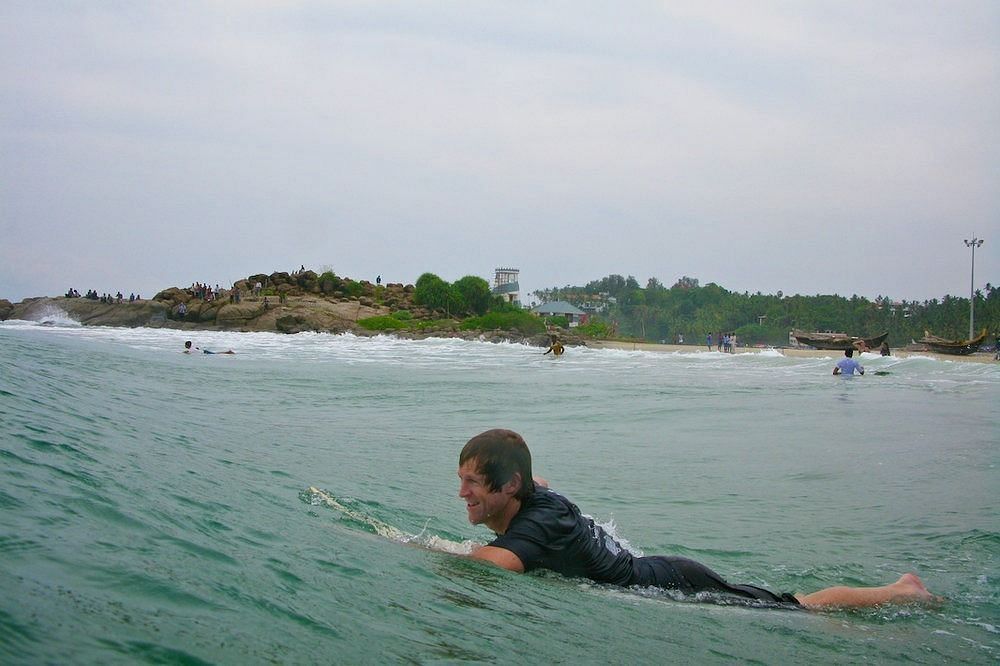
Exposure to more competitive surfing will help India compete at the highest level, including the Olympics: Jonty Rhodes [Exclusive]
Renowned for his acrobatic fielding on the cricket field, Jonty Rhodes has also been a driving force behind the surge of interest in surfing within India. Serving as the Surfing Ambassador for the Surfing Federation of India since 2012, Jonty has played a pivotal role in the country's emergence as a significant player in the global surfing community.
India made waves at the Asian Surfing Championship, 2023, held at Thulisdhoo Island in Maldives. Competing against 18 countries from Asia, the Surfing Federation of India sent a team comprising four senior surfers in the men’s category and two surfers in the Under 18 category, with five out of the six surfers hailing from Tamil Nadu. India scored 2,708 points as a team, securing the third position and winning the bronze medal.
Later, in August 2023, India achieved a historic milestone by hosting the World Surfing League event for the first time in Tamil Nadu. The Tamil Nadu International Surf Open QS 3000, held in Mahabalipuram, witnessed Japanese duo Sara Wakita and Tenshi Iwami securing memorable victories. This event marked a pivotal moment for India's surfing scene.
Sportskeeda caught up with Jonty Rhodes for an exclusive interview. In this interview, we delve into Jonty's insights regarding India's journey in surfing, the recent developments in the sport, and the road ahead.
Q: As the brand ambassador for surfing in India, how do you assess the success of WSL in our country?
Jonty Rhodes: Over the past 12-13 years, I've served as a surfing ambassador in India. Witnessing this culmination of a lengthy journey, starting from the fishing villages in Tamil Nadu, Vizag, and Mangalore to hosting a World Surfing League event in India, is truly incredible. The growth of surfing has been gradual, with surf schools driving the momentum.
However, credit must be given to Mr. Arun Vasu, the President of the Surfing Federation of India, for his direction and efforts. Seeing this event unfold in Mahabalipuram after being involved for over a decade is truly remarkable.
Q: How do you perceive the growth of surfing in India?
Jonty Rhodes: India's vast coastline and population provide a significant advantage for surfing's exponential growth. The recent congestion in surf spots like Mahabalipuram up to Kovalam indicates the burgeoning interest in the sport. Exposure to international athletes through events like the WSL is crucial for our athletes' development.
The support from the Tamil Nadu government, both in funding and backing, is instrumental in ensuring our surfers benefit not only from competition but also from interacting with top athletes from around the world, especially Japan.
Q: India didn't make it to the finals or the semi-finals this time. Where do you think India needs to improve?
Jonty Rhodes: Many Indian surfers have been honing their skills for the past decade but lack exposure to competitive surfing. The introduction of the pro tour with events in Pondicherry, Mahabalipuram, and Mangalore offers more opportunities for our surfers.
However, they need to acclimatize to the pressure of competition, akin to a World Cup final in cricket. There's certainly ability and certainly skills, but having the opportunity to surf in these contests will grow their surfing. More contests and a focus on simulating competitive scenarios in training will prepare them better for international events.
Q: India is witnessing growth in surfing. When can we expect India to compete with top athletes in the Olympics?
Jonty Rhodes: Remarkably, India has formed a national surfing team within the last twelve months. That team has been to El Salvador, Sri Lanka, and Maldives. Their achievements, including a bronze medal in the Asian Surfing Championship 2023, showcase tremendous progress.
It’s a huge jump from literally no team to coming third in the Asian region. With increased exposure to competitive surfing, particularly at the international level, our junior surfers will soon surpass their senior counterparts and compete at the highest level, including the Olympics, within the next three to four years.
Q: Having been associated with surfing for a long time, what do you find most exciting or challenging about the sport?
Jonty Rhodes: One of the challenges lies in maintaining safety standards and growing the surfing community amidst the rise of surf schools. It's crucial to certify surf coaches and ensure the safety of surfers to avoid tarnishing the sport's reputation. Additionally, fostering a sense of community within the surfing fraternity is vital.
Arun Vasu plans to send young athletes around the world for maybe a two-month camp in Sri Lanka or in the Maldives, where they have exposure to different coaches, to different styles of different waves, because every wave that you go to is very different, and requires a different kind of surfing.
By providing opportunities for young surfers to train globally experiencing various waves and coaching styles, we prepare them to excel in diverse conditions, akin to cricket players mastering different pitches worldwide. This exposure and willingness to step out of their comfort zones are essential lessons for our future surfers.
This interview was filed with inputs from Meeth Agrawal.